Nanning
This was a city with more than one million inhabitants. It was a nice city. The people were all very kind. But nobody spoke any English, not to mention German or any other European language.
The only way of communication was the sign language. We went to a hotel with the name of Chan and showed them the sleep sign and we were shown to our room for 2.60 USD.
Remark: The photos on the right side may not be correctly adjusted if you use Mozilla Firefox or Chrome. I propose to use the Explorer of Microsoft instead.
Click the small picture to get it enlarged
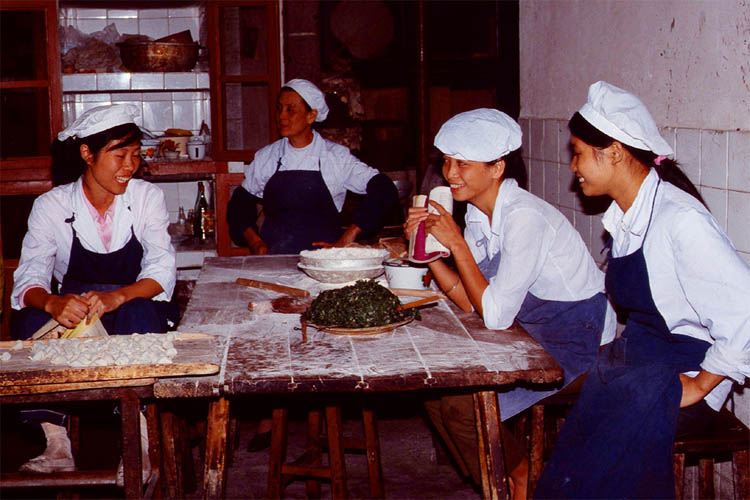
| Can we trust what the ladies prepare
|

| or shall we rather eat over there
|
For a more "sophisticated" talk or ordering in an upscale restaurant etc., I used my little English-Chinese phrase book I bought in Hongkong. Organized by topics I could point to one question and my Chinese counterpart pointed to one of ten answers and vice versa, all bilingual, of course. It also had a good list of Chinese meals, so we knew what we were eating, definitely not dog or snake.

| From the city of Nanning we escape
|

| to this beautiful landscape
|
So, it also was easy to hop on a bus going to some of the interesting places. And one of these were close to the Vietnamese border. This was also a tourist spot for Chinese visitors. One of them I talked to was some kind of a chemist from Canton and had business to do in Nanning and he invited us, if we should come back to Canton.

| Higher and higher we climb
|

| until we almost could see Vietnam
|
How to continue to get to our paradise island. The next harbor for the boat was Zhanjiang and another 300km away. Since these cities are connected with rails it was clear that we take the train now a second time.
Getting tickets for the day train was easy (5 USD) but not so getting on the train. There were thousands of Chinese squeezed together in the station hall. As soon as the train rolled in, a small gate to the platform was opened and everybody wanted to get on the train first, the Chinese way: with elbows. I wondered whether we would get a seat.
But oh wonder, in the end everybody did get a seat. So did we. And we had interesting company and an interesting conversation. A professor with his daughter. That what he showed us as an answer in my phrase book, because they could not speak English either.

| The train is the best transportation
|

| and to have a good conversation
|
Zhanjiang
This city was once ceded to France in 1898 for 99 years, like Hongkong to England, but it was already returned to China in 1949. There were still some old and faded European style buildings in the old French settlement. That's all.
I just wanted to get on a boat for Hainan as fast as possible. There was a ship next day for the first time after a typhoon has struck this area. The weather still looked like the aftermath and the sea might be still rough.
Manfred was afraid to go any farther all of a sudden. Or he did not expect much of my "Tropical Island". So he booked the night train to Guilin (to buy another souvenir) and I booked the passage, not to India but to Haikou.

| Arriving in Zhanjiang just hit by a typhoon
|

| and was lucky to find a ship going to Haikou
|
At first sight of the ship I thought maybe it wasn't a good idea. It was old and rusty and I wondered if I would survive if it sinks. The crowd disappeared in the video lounge under deck. I rather stayed on deck to be first to reach the lifeboat.

| The deck was full of rusty junk
|

| I should have gone with a real junk
|
During the trip other Chinese joined me on the deck and we had a real good conversation. Yes, and that all in English. Those girls and boys really came after me to practice their American English with me. They all studied at the university in Beijing and their English teachers were all Americans.
Haikou
Haikou is the capital of the tropical Hainan Island, just 50km off the southern Chinese mainland. Take a look at the map below.

As soon as we arrived in Haikou, I settled down in a guesthouse and then I was taken on a business tour by one of the "boys", who was working as a business journalist and then next day on a sight-seeing tour by one of the "girls", who was working for an import/export company.
The Island of Hainan was a special Economic Zone offering preferential terms to attract foreign investors and for new enterprises and entrepreneurship. The Chinese government wanted that this develops into another Hongkong. So a lot of professional people are needed.
The journalist dragged me from one company to the other. At a real estate company we were invited for dinner. The architect showed me his plans of new high-rise hotels and condominiums at the seaside. I urgently advised against it. No building should be higher than the palm trees, I told him, and that tourists from Europe would not like to stay there. I also told him of bad examples in Spain. He was impressed and wanted to hire me as a consultant, with an apartment as a perk.

| My new Chinese architect friend and journalist friend
|

| and my Chinese import and export business lady friend
|

| Being shown
|

| around town
|
Heaven's Limit or the End of the World
To take a look at the site of which my architect was talking about I had to go down south almost 300km, close to Sanya. I wanted to go there anyway.
Oh yes. Now I could see that nothing had been spoiled this beautiful beach and the hinterland, yet. And it really was fantastic. And it also was the only tropical spot in all of China with a warm climate in the winter. I pitied Manfred who now was in the wet and cold north. The resort I settled down was right at the beach. It was called Dodongday and was cheap for 2.60 USD.

| Finally I reached my destination close to Sanya
|

| and how I now really enjoyed the warm sun, yeah.
|

| I stayed in this beautiful resort
|

| with a white sandy beach in front
|

| I seemed to be the only one between Asians
|

| Until I met these three female Caucasians
|

| This is the "Heaven's Limit" but easy to reach
|

| This girl is waiting for more tourists to come to this beach
|

| There is already a tourist infrastructure with camel rides
|

| and all kinds of souvenirs the beach already provides
|

| This is the new entre-preneurialism
|

| within the changing communism
|
Sanya City
The city itself was not so impressive. It was like Aberdeen on Hongkong Island twenty years ago from the time I was here. And no big enterprises like in Haikou.

| New business' sprang up everywhere
|

| But old fish markets still prevail
|

| New ways with motorized transport
|

| But the bicycle is still being used a lot
|

| The way to sell coconuts will resist any changes
|

| and selling veggies is still the way like in the old ages
|

| Many people still live in these old settlements
|

| In the city people have already become tenants
|
Hainan Island Tour
There was no guided bus tour through the southern part of Hainan. So no tourist infrastructure. And that was good so. I took the local buses to get around and looked at some of the few spots as they were listed in my guidebook

| Also back now to the countryside
|

| They are not very much modernized
|

| Old buses plying around the straw on the roads
|

| Many people are still living in the harbor on old boats
|

| Making their living from the fish industry
|

| and from the cultured pearl industry
|

| The coast with a mountain
|

| The Monkey Mountain
|
Back in Haikou
Same bus back up north to Haikou. Didn't meet my old Chinese "friends" again, though I settled down in the same guesthouse as before. But I met a new Chinese "friend", who also stayed there. Unfortunately she couldn't speak any English, but sign language was unmistakably understood.

| That was not my accommodation where to sleep
|

| But slept with that girl in the same guesthouse very cheap
|
Before I went down to southern Hainan I had already booked a flight to Canton. There was another option from here to go directly to Hongkong by boat but that would have taken some time and the time table was not reliable.
On my last day in Haikou I just was strolling around by myself. Especially the markets were of primary interest. But in China that is only for people not getting sick to the stomach easily, but it's actually for the stomach to digest.

| Back in Haikou, oh holy snake
|

| They are selling dead rats, oh forsake
|

| It's ok to eat delicious frogs
|

| but it's gruesome to eat dogs
|
Back in Canton
It was a smooth flight and a smooth landing over Canton. I enjoyed it as the plane descended directly over the city. And I also enjoyed the city.

| From Haikou getting back by plane to Canton quick
|

| Landing smoothly over the railway station without getting sick
|
It was such a tranquility in a city with a population of almost four million. And also the inhabitants looked very relaxed and seemed to be very content. How can it be so peaceful to live in a communist country. But there must have already been some unrest brooding in some parts of China which culminated in the Tiananmen Square protest and subsequent massacre one year later in 1989.

| In the middle of it all what a tranquility
|

| And the beautiful temples in the city
|

| Even the different religions side by side
|

| seem to live peaceful together, right.
|

| And with relaxing Tai-Chi
|

| A tennis match played easy
|
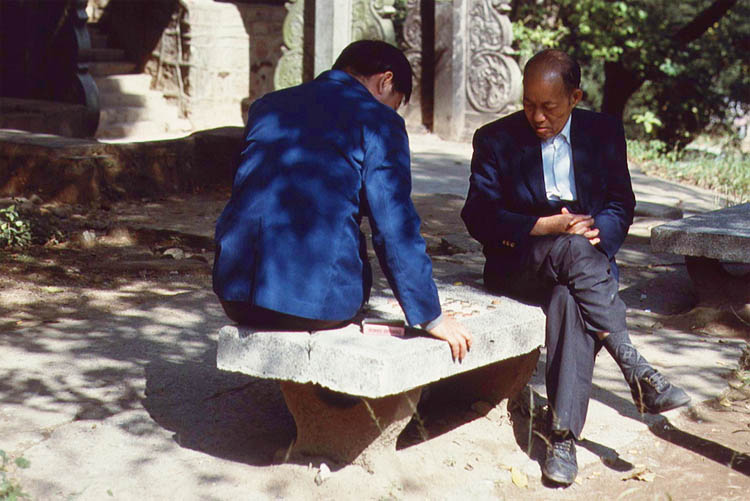
| Playing a game like chess
|

| or just contemplating or chat?
|
The Chinese people are also working hard. Even more so after Deng Xiaoping introduced some economic reforms to alleviate poverty and to reach a better standard of living. Now the people know what they are working for.
So let's find my Chinese friend I met in Nanning and see how he is working. The address he gave me was his home and company addresses. Ok, I found him at work and he was pleased to see me again. He was also ready to finish his work in some kind of a chemical laboratory and took me to his home.

| The address of my Chinese friend not easy to find
|

| That's him with his two sons and his wife
|
He was really all excited. He bought a couple of beer bottles on the way resisting any attempt by me to pay for it. He lived in a rather new flat in a tenant building with his wife and two teenaged sons.
The reception was overwhelming. Dinner was ready with all the Chinese delicacies. No rice was being served. Only poor people eat rice, I was told. Thus definitely not the foreigner guest, they probably thought. One special treat for the special guest was personally selected by the wife and put on my plate: roasted chicken feet. Actually a good diet: only yellow skin, bone and nails. Ok, I ate one, being a good guest, as long as it wasn't snake or dog.
The farewell was hearty and I went back to my hotel. Next day was a leisurely sight-seeing day.

| Looking up a waterfall to the temple above
|

| Looking up a monument with a plaque above
|

| Looking down to one of the modern cities
|

| built with many broad streets and bridges
|
The city was also very clean and unpolluted. Very few combustion engines were roaming the streets, but more so bicycles, already causing a traffic jam sometimes, especially during rush hours. I don't want to walk in the streets today, twenty years later, where all bicycles may have become motor bikes or automobiles.
I don't want to lecture about climate change now. And we do not have the right to deny the Chinese the same what the First World already has. But it also should follow the same new initiatives to reduce Carbon Monoxide, etc., already introduced in other countries. But what if an allowance is based on per capita?

| The main transport in the city
|

| is still the good old bicycle
|
Ancient China was very advanced, not in technical terms but in architecture and art. The old communists didn't value the old values, because that was bourgeois. Now this has also changed to the better. Not necessarily old buildings but temples have been renovated and museums are maintained.

| Many old houses are still standing
|

| so are the old temples still remaining
|

| A museum shows the pre-bicycle area
|

| and the old ruling pre-nomenklatura
|

| At the time the wall was built and the tree sown
|

| this terracotta soldier may have been born
|

| She is knitting a new costume
|

| and posing in her old imperial costume
|
And many Chinese seem to be flower lovers, or more so flower pot lovers. You see the pots everywhere in the streets and around houses. They are nature lovers, but may have been constrained in the past by scarce own land resources to have their own ornamental plants around. Even if more land is available now, especially in public parks, they still keep the old custom alive.

| The entrance to a special park
|

| To call it a garden would be off the mark
|

| Most flowers are planted in a pot
|

| Is this the famous flower pot god?
|
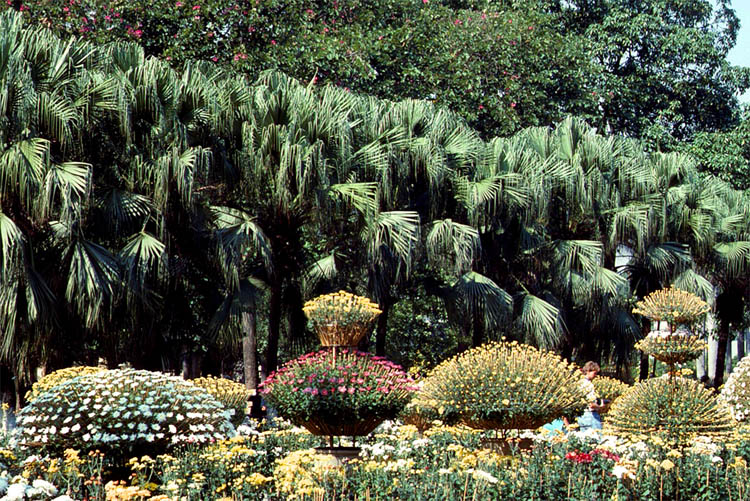
| Flower pot landscapes seems to be one of the many Chinese arts
|

| The boy is not afraid of the dragons made of flower plants
|
Children, children, children, everywhere. No, not everywhere like in the Third World, but just more to be seen around schools and playgrounds. And even with the one-child family policy, there are still enough children because they are still just too many Chinese. And the children I have seen are all well fed and nicely dressed. Those children are really precious, because parents want and can afford to do their best and to give their children everything they need to become well-educated citizens.
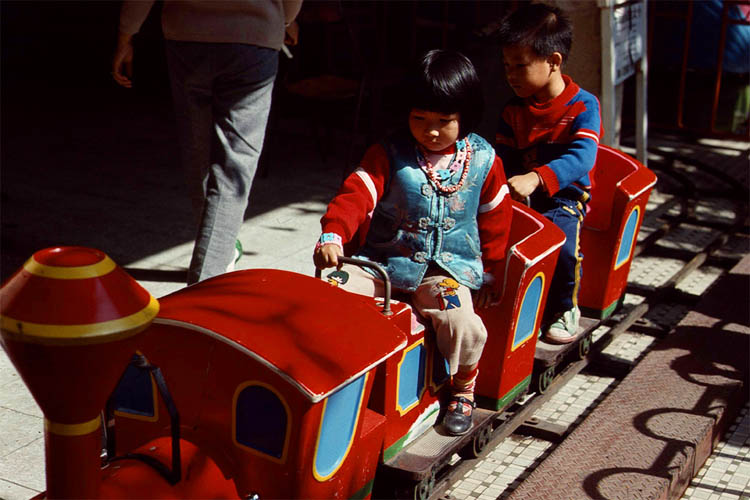
| The children don't live here in misery
|

| it's the Chinese "One child family" policy
|

| Thus all Chinese parents do their very best
|
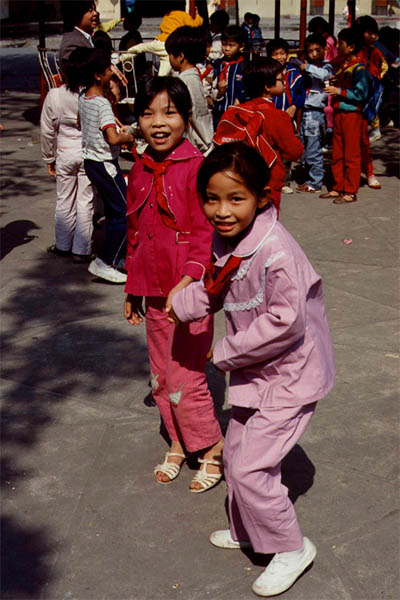
| to make children happy and well dressed
|

| But on the children's part
|

| They also have to learn hard
|
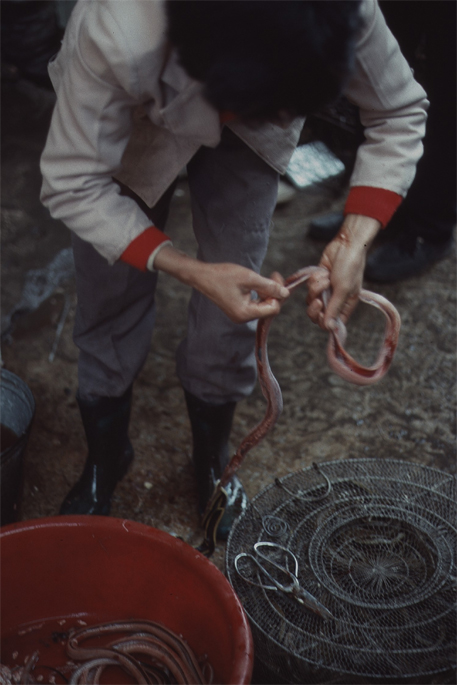
| Will they still be skinning live snakes and eat these
|

| Will they still believe in this kind of remedies
|

| Will the kids still eat dogs
|

| or boys believe in enlarging their cocks
|
From Canton I took the night boat for around 15 USD to Hongkong leaving at 9 p.m. I had my own private cabin and I slept like dead. Arriving in the morning I met Manfred again in the same guesthouse we stayed in before. After another day and night in Hongkong I flew back to Germany and Manfred to the Philippines.
Ok, that was China , though only a very small part of it. I could have seen and done a lot more. Also I could have written more. If you want to know more all about the places I have visited, then just look up any of the many guidebooks or in the internet.
| 



























































































